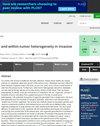Temperature-driven coordination of circadian transcriptional regulation.
IF 3.6
2区 生物学
引用次数: 0
Abstract
The circadian clock is an evolutionarily-conserved molecular oscillator that enables species to anticipate rhythmic changes in their environment. At a molecular level, the core clock genes induce circadian oscillations in thousands of genes in a tissue-specific manner, orchestrating myriad biological processes. While previous studies have investigated how the core clock circuit responds to environmental perturbations such as temperature, the downstream effects of such perturbations on circadian regulation remain poorly understood. By analyzing bulk-RNA sequencing of Drosophila fat bodies harvested from flies subjected to different environmental conditions, we demonstrate a highly condition-specific circadian transcriptome: genes are cycling in a temperature-specific manner, and the distributions of their phases also differ between the two conditions. Further employing a reference-based gene regulatory network (Reactome), we find evidence of increased gene-gene coordination at low temperatures and synchronization of rhythmic genes that are network neighbors. We report that the phase differences between cycling genes increase as a function of geodesic distance in the low temperature condition, suggesting increased coordination of cycling on the gene regulatory network. Our results suggest a potential mechanism whereby the circadian clock mediates the fly's response to seasonal changes in temperature.温度驱动的昼夜节律转录调控协调。
昼夜节律钟是一种在进化过程中保存下来的分子振荡器,它能使物种预测环境中的节律变化。在分子水平上,核心时钟基因以组织特异性的方式诱导数千个基因产生昼夜振荡,从而协调无数生物过程。虽然以往的研究已经探究了核心时钟回路如何对温度等环境扰动做出反应,但对这种扰动对昼夜节律调控的下游影响仍然知之甚少。通过分析从不同环境条件下收获的果蝇脂肪体的大量 RNA 测序,我们展示了高度条件特异性的昼夜节律转录组:基因以温度特异性的方式循环,其阶段分布在两种条件下也有所不同。通过进一步利用基于参考的基因调控网络(Reactome),我们发现低温条件下基因与基因之间的协调性增强,网络相邻的节律基因也实现了同步。我们报告说,在低温条件下,循环基因之间的相位差随着大地距离的增加而增大,这表明基因调控网络上的循环协调性增强。我们的研究结果表明了昼夜节律钟介导苍蝇对季节性温度变化做出反应的潜在机制。
本文章由计算机程序翻译,如有差异,请以英文原文为准。
求助全文
约1分钟内获得全文
求助全文
来源期刊

PLoS Computational Biology
生物-生化研究方法
CiteScore
7.10
自引率
4.70%
发文量
820
期刊介绍:
PLOS Computational Biology features works of exceptional significance that further our understanding of living systems at all scales—from molecules and cells, to patient populations and ecosystems—through the application of computational methods. Readers include life and computational scientists, who can take the important findings presented here to the next level of discovery.
Research articles must be declared as belonging to a relevant section. More information about the sections can be found in the submission guidelines.
Research articles should model aspects of biological systems, demonstrate both methodological and scientific novelty, and provide profound new biological insights.
Generally, reliability and significance of biological discovery through computation should be validated and enriched by experimental studies. Inclusion of experimental validation is not required for publication, but should be referenced where possible. Inclusion of experimental validation of a modest biological discovery through computation does not render a manuscript suitable for PLOS Computational Biology.
Research articles specifically designated as Methods papers should describe outstanding methods of exceptional importance that have been shown, or have the promise to provide new biological insights. The method must already be widely adopted, or have the promise of wide adoption by a broad community of users. Enhancements to existing published methods will only be considered if those enhancements bring exceptional new capabilities.
 求助内容:
求助内容: 应助结果提醒方式:
应助结果提醒方式:


